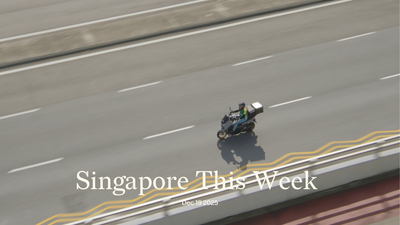International: Now I am become Death, the destroyer of bytes
On August 9th, rouse yourself not for the anthem, the president, or the annual bonhomie between the PAP and “PAP-lite”; not the F-16s or Apaches puncturing an island’s calm with booms and whops that comfort, or the crafts crashing across waters in which fish once thrived, or the armoured vehicles barreling down tarmac that will soon host supercars; and not the over 3,000 performers and 39 artistes glowing in their finest hour. Save your fervour instead for a geeky group that has emerged from its digital den to bask in the national limelight for only the third time.
The Digital and Intelligence Service was incorporated as the fourth branch of the Singapore Armed Forces in 2022, to “defend and dominate in the digital domain”. By then we had suffered a number of cyber attacks, notably the 2018 SingHealth data breach, which compromised 1.5m patients. Last week, K Shanmugam, home affairs minister, coordinating minister for national security and our swaggering sheriff, revealed that UNC3886, a state-linked advanced persistent threat (APT) actor, has been attacking our critical information infrastructure. “UNC3886 poses a serious threat to us, and has the potential to undermine our national security,” he said. Indeed. Attacks that knock out our power systems, or compromise telecommunications and payment systems, could have devastating consequences. APT attacks increased four-fold from 2021 to 2024, Shanmugam said. Mandiant, a Google cyber-security subsidiary, first identified the “suspected China-nexus cyber espionage actor” in 2022. Shanmugam was careful not to reference Beijing, but others did. (The Chinese embassy in Singapore denied links.)
Contemporary cyber-warfare can be traced to Iran’s nuclear enrichment programme. In 2010, almost 1,000 centrifuges were crippled by a “Stuxnet” worm targeting their German-made Siemens systems. A programming error allowed the worm to escape across the internet. Stuxnet was subsequently broadly recognised to be a joint US-Israel operation, codenamed Olympic Games. Initiated under George W Bush, the US’s cyberweapons programme was, according to The New York Times, accelerated by Barack Obama, who believed it to be the lesser of two evils—a cyberattack over a conventional one. He allegedly unleashed it while cognisant of the echoes with 1945’s atomic bombs, and that the US’s use might legitimise the same by terrorists and others. It is poetic that our world was thrust into cyber war by efforts to stamp out nuclear; and that in 2009, as he was quietly developing “Olympic Games”, Obama was publicly accepting a Nobel Peace Prize.
“Unlike nuclear or chemical weapons, which have some kind of internationally enforceable inspection arrangements and balances of power, cyberweapons are deniable and denied, protected by a new kind of macho-geekery and silence,” said The Guardian in its review of “Zero Days”, a 2016 documentary about Stuxnet. Israel and the US, Singapore’s allies, have never accepted responsibility for it. Why would anybody? On August 9th, say hello to our new world. Here we are.
Some further reading: In “National Service: why we need a deeper discussion”, Jom argued that Singapore needs to refocus its defence efforts towards today’s primary external threats, including terrorists, cyber attackers, and cyber influence operations from the likes of Beijing and Moscow.
Society: Respite from ‘The Fever Demon’?
“[T]he harrowing, racking, twisting, grinding pains…now extend all over the body from the crown of the head to the joints of the toes,—rendering the sufferer perfectly helpless and making it literally impossible to raise either hand or foot,” read a letter published in the Straits Times Overland Journal (STOJ) in 1872. Dengue, the mosquito-borne viral fever endemic to the tropics, has long elicited vivid descriptions from terrified victims. The WHO estimates nearly 100m active infections occur annually, with 70 percent of those in Asia.
Since independence, outbreaks in Singapore have waxed and waned. One notable surge followed the government’s 1960s and 1970s “Garden City” campaign which sparked a torrid affair between amateur horticulturalists and home flowerpots. Since then, Singapore’s increasingly robust public health system has kept fatalities to a minimum. Only 27 of the 14,006 people infected during the 2005 outbreak died, a mortality rate of 0.19 percent. That dipped further to 0.09 percent during the 2020 outbreak, with 32 deaths from more than 35,000 cases. Yet, even one preventable death is too many. Dengue inspires a special kind of dread in parents: children, along with the elderly, are most susceptible to life-threatening infection.
The disease’s unique pathology makes it extremely complex to prevent and treat. Like many viruses, it has no treatment beyond symptom control, rest and hydration. A patient’s illness depends on which of the four serotypes (varieties) was carried by the mosquito that bit them. An infection confers permanent immunity only against that type while, terrifyingly, increasing the likelihood of a more severe infection from another. This diversity has stymied vaccine development; one in the market even increases the risk of a severe illness in those who haven’t had dengue before. What?
But there may finally be some hope. A new vaccine candidate has entered Phase III trials—the last step before regulatory approval, also the most rigorous and time-consuming. Developed by US pharma company Merck, the V181 vaccine uses weakened versions of all four serotypes to, hopefully, provide broad protection against dengue for children aged two to 17. The National University Hospital and Tan Tock Seng Hospital are the Singapore institutions participating in the regional trial, which aims to enrol 700 participants to receive either V181 or a placebo.
“The…blessings of millions will be the reward of him who can successfully enter the lists against this modern monster who so unflinchingly and impartially prostrates both the ‘King in his palace and the dweller in his hovel.’” If successful, the trial could yield a vaccine in three to five years, over a century and a half after STOJ’s correspondent made their anguished plea.
Society: Singapore’s domestic recycling blues
Residents and businesses continue to recycle less. Last year, the domestic recycling rate dropped to a record low of 11 percent, down from 12 percent in 2023 and 2022. This includes waste from households and trade premises, such as hawker centres, shophouses, educational institutions. Our city-state’s overall recycling rate, which includes industrial and commercial premises, also fell, from 53 percent in 2023 to 50 percent, compared to 60 percent a decade ago. On the upside, Singapore’s daily waste generation rate per capita has kept decreasing for both sectors. The National Environment Agency, which released this annual data, said that efforts to improve recycling rates will focus on food, paper and plastics, as they make up the largest amount of rubbish that’s not recycled.
Recycling has existed in Singapore for decades. From farmers collecting food waste to feed pigs, to the backbreaking work of local karung guni men, to the launch of the national recycling programme in 2001. But given the country’s various ways to get us to waste less by recycling more, why does it remain such an insurmountable task? These days, it’s not for lack of infrastructure, education or incentives. Blue recycling bins are ubiquitous across public and private housing estates, and the government provided reusable, recycling boxes to all homes. The problem is that recyclables are contaminated by items that aren’t cleaned properly, non-recyclables and food waste. About 40 percent of what’s in the bins end up in the landfill anyway. There’s no shortage of suggestions on how to increase recycling rates and reduce contamination: invest in more recycling plants; enhance the circular economy and closed-loop systems by raising the demand for recycled content in new products; spot checks; separate recyclables according to the type of material; and reduce the number of general waste bins in public areas (which, perhaps counter-intuitively, will force people to to be more conscious of waste generation).
Countries with the best recycling rates globally, such as Germany, South Korea, Taiwan, and Wales, have managed to direct more than 50 percent of their municipal waste into the recycling process. What sets these populations apart is a culture of conservation and social consciousness. The Japanese, known for their plastic recycling programme, have a word to encapsulate the feeling of regret when wasting something valuable—‘mottainai’. Perhaps it’s this innate spirit of care and concern for the environment that’s lacking here. A quality that hasn’t been nurtured due to our highly efficient waste management system (including the rubbish chute), and our propensity to respond to the stick. Punitive measures like fines and corrective work orders may stop us from littering or nudge us into clearing our dirty dishes and utensils. But there is a limit to how much fear and shame can compel behavioural change. Better to cultivate attitudes and behaviours founded on civic-mindedness, rather than punishment.
Society: Kpods, a sign to consider a harm reduction approach?
Globally, it’s worrying that more kids are trying and getting addicted to e-vaporisers (vapes). In Singapore, the reported cases of students (up till higher education) possessing or using vapes grew from 800 in 2022 to 900 in 2023 and 2,000 last year. The e-cigarette was invented by Chinese pharmacist Hon Lik to cure his own smoking addiction after losing his father to lung cancer. And experts do still consider vaping a potential harm reduction tool for cigarette smokers. But it has its own risks. Adolescents who have never picked up a pack of Marlboros before may be lulled into thinking it’s safe. Far from it. Alarmingly, a recent local enforcement operation found a third of more than 100 vapes tested at random to contain etomidate—an anaesthetic used in clinical practice to induce sedation. Such drug-laced vapes are known as Kpods and may also contain synthetic weed (Spice or K2) or THC oil, which is the active ingredient in cannabis.
The 2018 ban on e-cigarettes/vaporisers reflects Singapore’s harm prevention approach. In response to Dr Jeremy Lim’s forum letter appealing for a harm reduction approach—which Jom supports—the Ministry of Health reinstated its belief that a zero-tolerance approach towards drugs is far more effective, as a harm reduction approach will supposedly enable more drug consumption. Seven years later, the ban has unwittingly enabled a flourishing black market where vapes are sold with no regulation on product quality. In classic Singaporean style, the rise of Kpods has been accompanied by apparent fearmongering: stories of individuals getting addicted to etomidate, as well as harsh crackdowns on those caught selling, possessing and consuming. Some may think the stance is warranted due to the urgency of the situation, though it’s also important to adopt a more caring and compassionate approach—as suggested by Allkin Singapore and a Youth Corp volunteer—and identify the root causes of habitual Kpod use.
Central to harm reduction principles is recognising how the realities of inequalities, discrimination, social isolation, and past trauma can affect one’s vulnerability to and capacity for effectively dealing with drug-related harm. Experiences of loss, grief and stress were notable in the reflections of former Kpod addicts. Is there a correlation between deteriorating mental health—one in three youth in Singapore reported very poor mental health—and a person’s vulnerability to drug-use as a coping mechanism? If so, we may need to engage in a deeper interrogation of institutional structures and cultural norms that have shaped Singapore’s highly competitive education system. And subsequently, how this culture bleeds into adult life through the lack of work-life balance amidst the rat race. Unless we acknowledge and tackle these societal ills, demand for vapes laced with etomidate—and all its still-unknown successors—will continue to be high.
History weekly by Faris Joraimi
I’m in Padang, Indonesia this week for a workshop hosted by a local university. And I’m reminded again of just how close we are to places with deep histories. This city on a flat coastal plain facing the Indian Ocean, backed by the stunning Minangkabau highlands, is an important link in Singapore’s regional past. Now the capital of Indonesia’s West Sumatra province, Padang is part of a much older cultural region, the ranah Minang or Minang lands. Its heartland (darek) lies up in the hills overlooking Padang, where the domains of Tanah Data, Agam, and Limo Puluah Koto were first organised into village-republics (nagari) long ago. Outside the darek is the rantau, areas to which Minang traders, farmers, and adventurers later went and incorporated into the Minangkabau world. Life is regulated by adat, transmitted over centuries. Often translated as “custom”, adat is better understood, as the Minang scholar Taufik Abdullah wrote, to be “the entire value system, the basis of all ethical and legal judgment, as well as the source of social expectation.” A famous feature of Minangkabau adat is the matrilineal lineage system where property rights are held by women and passed down from mothers to daughters.
Before Dutch colonialism, the autonomy of the village-republics coexisted ambiguously with the royal authority of sultans in Pagaruyung. They were heirs of Alexander the Great, just like the Malay kings of Singapore, Malacca and Johor. European visitors were puzzled at how much documents issued in the name of these rulers were obeyed throughout the Minang lands and beyond even though his “real” power was limited. In 1818, Stamford Raffles trekked uphill from Padang to find this mysterious “Emperor” under the clouds, along the way seeking local headmen’s permission to pass. He found Pagaruyung burnt down, though was convinced of its antiquity as the “original” Malay kingdom—a romantic view he took about Singapore too.
The dramatic landscape of Minangkabau is still a sight to behold. Rice terraces, winding roads, rumah gadang with tiered roofs rising in sharp spires, steep slopes descending into lakes: a geography sculpted by ancient volcanic activity and long human habitation. The likes of Bali, Komodo, and Raja Ampat might dominate our popular imagination, though other nearby lands shouldn’t slip past our attention, curiosity, and respect. Especially when so many Singaporeans have Minang origins (Eunos Abdullah, Zubir Said, Yusof Ishak, Lily Zubaidah Rahim, for example). Or that we savour Nasi Padang—which is not just any random assortment of Malay rice dishes—away from where those glorious flavours were first dreamt up and refined for ages.
Arts: Booksellers’ boons
Booksellers here are celebrating two small coups: Books Kinokuniya opened its third outlet at the Raffles City shopping mall last week, and Epigram Books has announced it’ll be publishing Workers’ Party (WP) stalwart Sylvia Lim’s memoir, likely in 2027. These are glad tidings in a gloomy publishing climate. The latest 3,433 sq ft bookstore, occupying a space left by electronics store Challenger, opened to modest fanfare and several dozen eager patrons. It features a Reading Room in an alcove that repurposes the signature dark blue shelves from its Ngee Ann City flagship store, as well as “exclusive” Japanese stationery. “Rather than bellyaching over their closures and lamenting their disappearance, the best thing we can all do to support bookstores is to visit them and buy books,” said Ervin Yeo, chief executive of commercial management at CapitaLand, which manages Raffles City. Last year, a study by the National Library Board revealed that 28 percent of adults in Singapore read a book at least once a week; of these, 75 percent go for physical copies over e-books, both in buying them from bookstores (54 percent) and borrowing them from libraries (51 percent).
But whether you’re an online or offline reader, you can eventually sate yourself on Sylvia “Mama Bear” Lim’s upcoming memoir. The publisher’s decision to whet our appetites so far in advance of the book’s release is a bit of a headscratcher, but judging from reactions to a mini documentary on Lim that the WP had rolled out for its recent general election campaign, there’s a craving for her personal chronicles. Commenters cooed over her relationship with her retired footballer husband, Quah Kim Song: “A football legend and an excellent politician we most respect. Congratulations to your marriage and all the best to the upcoming GE.” They also welcomed the steely lawyer’s vulnerable side: “Beautiful story @sylvialim65 thank you for sharing something so personal with all of us.” We might very well be witnessing the mainstreaming of the once-marginal opposition politician. Unlike the late JB Jeyaretnam, the WP secretary-general who hawked his life’s story on the streets post-bankruptcy, Lim’s inked a deal with the nonprofit behind one of the most lucrative literary prizes in Singapore. Edmund Wee, founder of Epigram Books, said he spent years softening the ground before Lim came around. Turning 60 with Singapore may have had something to do with it. “There has been interest from several quarters about the paths I have walked and the places I have been, as well as the people who made me whole,” Lim told The Straits Times. “As I turn 60 this year, it feels right to start to reflect on my experiences of life, vocation and love which, hopefully, will be meaningful not just now, but also for posterity.”
Some further reading: In his essay for Jom, Isaac Neo ruminates over how we might recapture the reading spirit in Singapore, whether that’s embracing the challenges of long-form reading or the communality of book clubs.
Tech: Hotel check-ins, brought to you by ChatGPT?
Will ChatGPT’s generative warmth replace the effusive hotel concierge? AI will soon power more parts of the tourism experience here, with a landmark partnership between the Singapore Tourism Board (STB) and OpenAI. This marks the first collaboration in Asia between a national tourism board and the ChatGPT creator. STB hopes to leverage OpenAI’s natural language processing, data analytics, and generative AI capabilities for everything from personalised recommendations to multilingual customer support. The partnership aligns with STB’s Tourism 2040 roadmap, focusing on three key areas: hyper-personalised visitor experiences— think AI-curated itineraries and immersive storytelling— operational efficiency for tourism businesses, and data-driven destination marketing. By piloting AI tools like robotics and context-aware chatbots, Singapore hopes to address persistent industry challenges such as labour shortages, language barriers, and getting visitors to return.
The initiative isn’t without risks. STB will need to navigate data privacy concerns and ensure AI complements rather than replaces human touchpoints in hospitality. The collaboration’s success hinges on seamless integration with local businesses, hotels, attractions, and SMEs that form the backbone of Singapore’s Passion Made Possible brand. Smooth execution could cement Singapore’s reputation as a lab for tourism innovation, but overreliance on AI could further dilute the cultural authenticity some travelers already find lacking in the highly polished city-state.
Tech: Can universities save deep tech?
In 2024, venture capital funding in Asia cratered to a decadal low of S$85bn, with investments in early-stage start-ups making up only S$38bn. For context, the corresponding figures in 2021 were S$247.5 bn and S$82bn. Middle-East tensions, deflation in China, and Japan’s lethargic growth have likely all contributed to such a precipitous decline. The dip is alarming because some of the most promising advancements—think revolutionary drugs or quantum computing, for instance—need far more patience and money in the early stages than the typical software start-up.
Recognising this, two of the region’s academic powerhouses are rewriting the playbook for research commercialisation. NUS’s new S$150m VC programme, a novel hybrid of direct funding and partnered VC support, arrives just as Japan’s University of Tokyo Edge Capital Partners (UTEC) closes a record US$326m (S$416m) fund which focuses on direct investments. While UTEC is an independent firm, it has a partnership with the University of Tokyo.
NUS is playing architect for Singapore’s deep tech ecosystem by deploying capital to catalyse deeper partnerships with venture funds in deep tech, as well as giving its alumni an advantage in capital access. Meanwhile, UTEC, with over US$1bn (S$1.28bn) assets under management, operates more like a scientific co-creator and identifies the best science and tech startups globally. The team uses proprietary AI and data science to identify promising research and provide hands-on support for drug discovery firms like PeptiDream, whose promise of therapeutics for a whole host of deadly diseases has turned it into a publicly-listed company with a US$1.4bn (S$1.79bn) market capitalisation. With Japan aiming to create 100 unicorns by 2027 and Singapore desperate to commercialise its research prowess, these programs are really national competitiveness tools. For deep tech founders across Asia, the message is clear: the road to viability now runs through campuses.
Faris Joraimi, Abhishek Mehrotra, Sakinah Safiee, Corrie Tan, Tsen-Waye Tay and Sudhir Vadaketh wrote this week’s edition. Liyana Batrisyia contributed.
If you enjoy Jom’s work, do get a paid subscription today to support independent journalism in Singapore.








